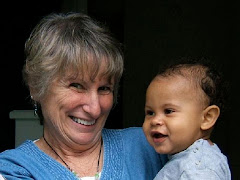Tuesday, June 19, 2012
Tip of the Iceberg or What Do Consequences Have To Do With It?
Imagine an enormous iceberg, what you see on the surface is only a tiny percentage compared to what is underneath. To continue to focus on behavior is like chipping away at all of the ice that is visible. Just as you get one chunk of ice removed, more just bobs up from what is below the surface. We cannot reach the bottom by chipping away at the top. If we chip away at behavior by using consequences and control without addressing the emotions under the surface...all we're going to get is more negative behaviors bobbing up. And if we keep doing what we've always done, we will keep getting what we've always gotten.
Tuesday, June 12, 2012
Limits
"What do we do when our child who has had a history of separation and loss, perhaps neglect, perhaps abuse, cries and tantrums when she doesn't get her way? She tells me that I'm not her boss and I can't tell her what to do and I can't yell at her. She will kick me and scream at me whether we are at home or out at a store or a park or wherever." This question from a very well meaning parent screams to me...I feel guilty and I am so exhausted. This parent goes on to tell me that she will give in to her child so that the child will calm down and then says to me...I know I'm not suppose to consequent her because she will feel threatened, and I am only trying to control her. At this point I say to this mom, stop and breathe. Yes, your child has had awful things happen to her, some unimaginable to us...she feels like she has no control and is not safe. You as the parent, will not help this if you let her have her way. You can help her without taking away privileges, without giving her time out, without depriving her of anything. And you need to in order for her to ever get regulated, in order for her to ever feel safe. Let her know that no, she can't go outside, she can't have more candy, she can't watch another DVD...let her know the limits. And then accept her rage...don't feel guilty about all she's been through. Let her know that she will be able to go outside again, when it isn't raining or when you can keep an eye on her. Let her know there will be more candy another time. But...not now and it is okay for her to be disappointed, it is okay for her to express her disappointment. Hold her if she will let you...walk away if you need to...wrestle her playfully to the ground if she'll let you and tell her it is okay...she is okay.
Wednesday, June 6, 2012
To Medicate or Not to Medicate...
that is a question that many parents and professionals struggle with when working with children who have challenging behaviors, their families and, let's face it, the many systems they come in contact with. I realize that for many, it is not an easy question to answer. Unfortunately, mental health practitioners and even the courts (in cases where children are a part of the social services system), are almost backed into a corner to say yes, let's at least try medication. And the age of children who are put on medication is younger and younger. And this is probably particularly true for children who are in "the system". A young child, age 4 who is "all over the place" in preschool, has difficulty keeping her hands to herself and at times has been know to be aggressive with other children, will be put on medication to help her be "more manageable" for a foster parent and the preschool. A nine year old boy, also in "the system" was said by the evaluating psychologist: that his behavior can is now able to be managed thanks to several medications that appear to keep him in a drowsy state all day and thereby dull his behavioral and emotional responsiveness to the extent that he is not able to act out even if he wanted to...in time, however, the evaluator states "these medications will require adjustments in his pre-teen years or earlier"...and then "he may not be as pliable as he is now."
Subscribe to:
Posts (Atom)


